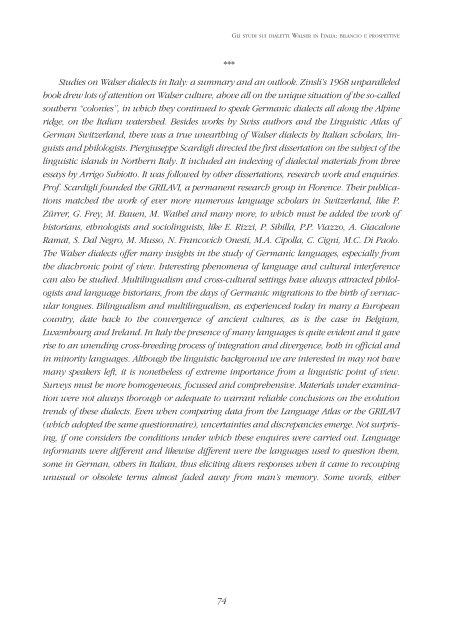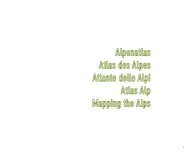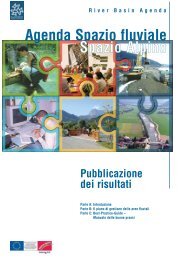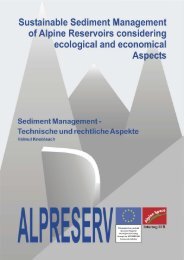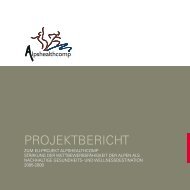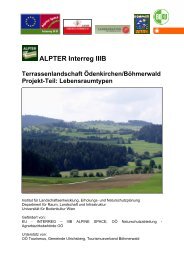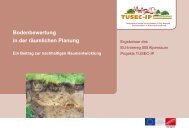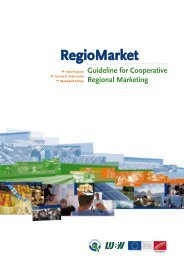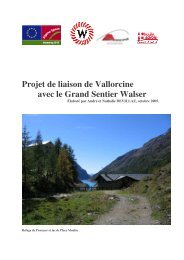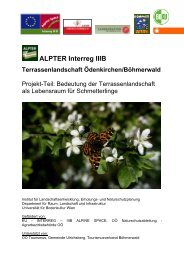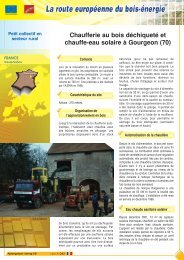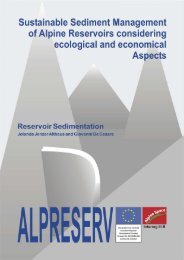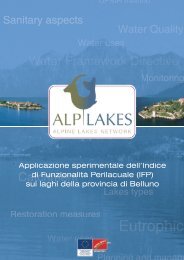WALSERSPRACHE - The four main objectives of the Alpine Space ...
WALSERSPRACHE - The four main objectives of the Alpine Space ...
WALSERSPRACHE - The four main objectives of the Alpine Space ...
Create successful ePaper yourself
Turn your PDF publications into a flip-book with our unique Google optimized e-Paper software.
Studies on Walser dialects in Italy: a summary and an outlook. Zinsli’s 1968 unparalleled<br />
book drew lots <strong>of</strong> attention on Walser culture, above all on <strong>the</strong> unique situation <strong>of</strong> <strong>the</strong> so-called<br />
sou<strong>the</strong>rn “colonies”, in which <strong>the</strong>y continued to speak Germanic dialects all along <strong>the</strong> <strong>Alpine</strong><br />
ridge, on <strong>the</strong> Italian watershed. Besides works by Swiss authors and <strong>the</strong> Linguistic Atlas <strong>of</strong><br />
German Switzerland, <strong>the</strong>re was a true unearthing <strong>of</strong> Walser dialects by Italian scholars, linguists<br />
and philologists. Piergiuseppe Scardigli directed <strong>the</strong> first dissertation on <strong>the</strong> subject <strong>of</strong> <strong>the</strong><br />
linguistic islands in Nor<strong>the</strong>rn Italy. It included an indexing <strong>of</strong> dialectal materials from three<br />
essays by Arrigo Subiotto. It was followed by o<strong>the</strong>r dissertations, research work and enquiries.<br />
Pr<strong>of</strong>. Scardigli founded <strong>the</strong> GRILAVI, a permanent research group in Florence. <strong>The</strong>ir publications<br />
matched <strong>the</strong> work <strong>of</strong> ever more numerous language scholars in Switzerland, like P.<br />
Zürrer, G. Frey, M. Bauen, M. Waibel and many more, to which must be added <strong>the</strong> work <strong>of</strong><br />
historians, ethnologists and sociolinguists, like E. Rizzi, P. Sibilla, P.P. Viazzo, A. Giacalone<br />
Ramat, S. Dal Negro, M. Musso, N. Francovich Onesti, M.A. Cipolla, C. Cigni, M.C. Di Paolo.<br />
<strong>The</strong> Walser dialects <strong>of</strong>fer many insights in <strong>the</strong> study <strong>of</strong> Germanic languages, especially from<br />
<strong>the</strong> diachronic point <strong>of</strong> view. Interesting phenomena <strong>of</strong> language and cultural interference<br />
can also be studied. Multilingualism and cross-cultural settings have always attracted philologists<br />
and language historians, from <strong>the</strong> days <strong>of</strong> Germanic migrations to <strong>the</strong> birth <strong>of</strong> vernacular<br />
tongues. Bilingualism and multilingualism, as experienced today in many a European<br />
country, date back to <strong>the</strong> convergence <strong>of</strong> ancient cultures, as is <strong>the</strong> case in Belgium,<br />
Luxembourg and Ireland. In Italy <strong>the</strong> presence <strong>of</strong> many languages is quite evident and it gave<br />
rise to an unending cross-breeding process <strong>of</strong> integration and divergence, both in <strong>of</strong>ficial and<br />
in minority languages. Although <strong>the</strong> linguistic background we are interested in may not have<br />
many speakers left, it is none<strong>the</strong>less <strong>of</strong> extreme importance from a linguistic point <strong>of</strong> view.<br />
Surveys must be more homogeneous, focussed and comprehensive. Materials under examination<br />
were not always thorough or adequate to warrant reliable conclusions on <strong>the</strong> evolution<br />
trends <strong>of</strong> <strong>the</strong>se dialects. Even when comparing data from <strong>the</strong> Language Atlas or <strong>the</strong> GRILAVI<br />
(which adopted <strong>the</strong> same questionnaire), uncertainties and discrepancies emerge. Not surprising,<br />
if one considers <strong>the</strong> conditions under which <strong>the</strong>se enquires were carried out. Language<br />
informants were different and likewise different were <strong>the</strong> languages used to question <strong>the</strong>m,<br />
some in German, o<strong>the</strong>rs in Italian, thus eliciting divers responses when it came to recouping<br />
unusual or obsolete terms almost faded away from man’s memory. Some words, ei<strong>the</strong>r<br />
74<br />
***<br />
GLI STUDI SUI DIALETTI WALSER IN ITALIA: BILANCIO E PROSPETTIVE


